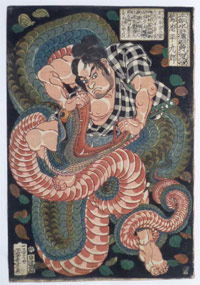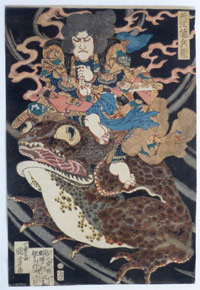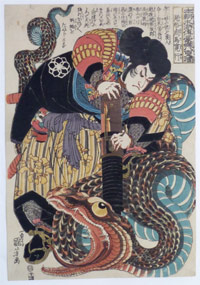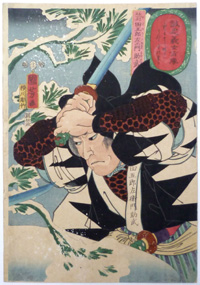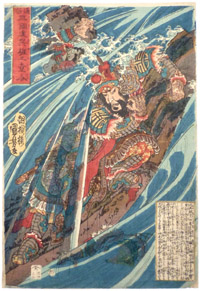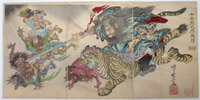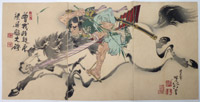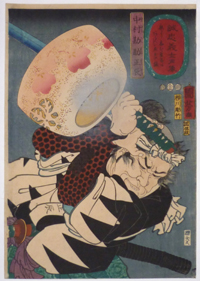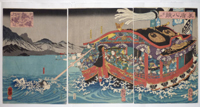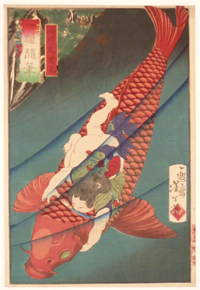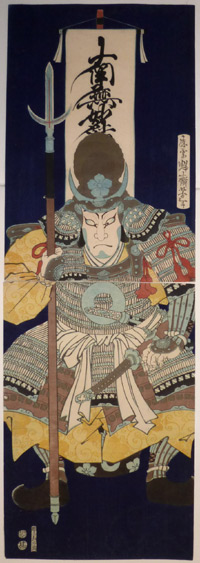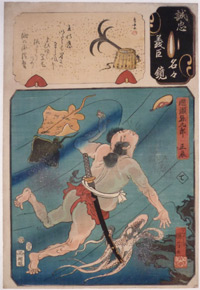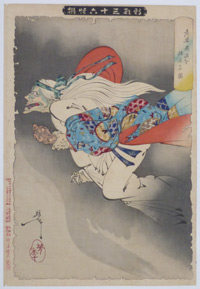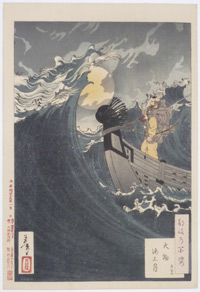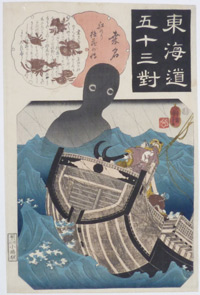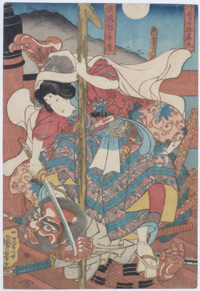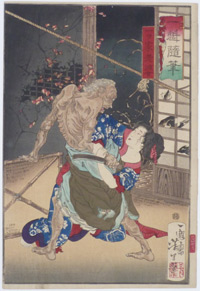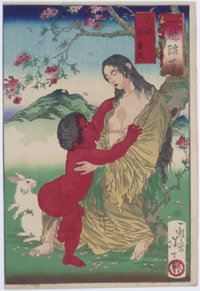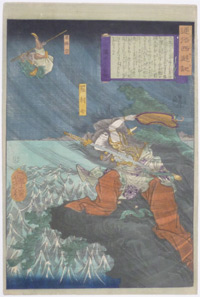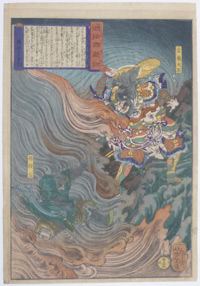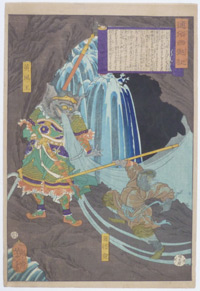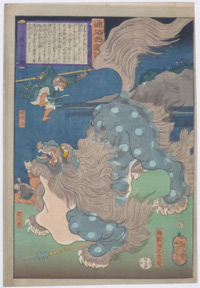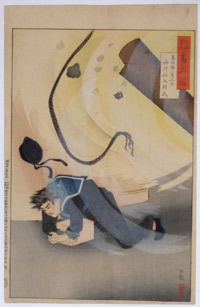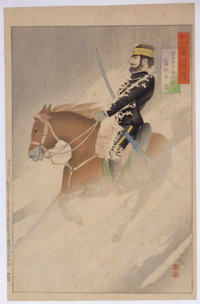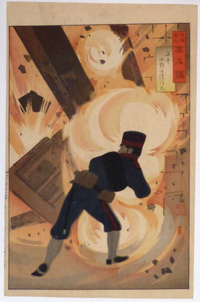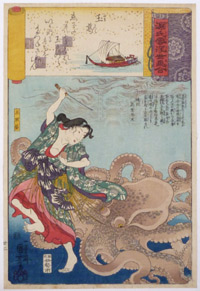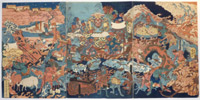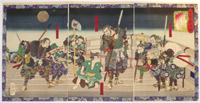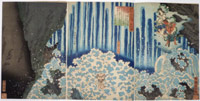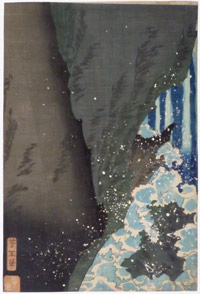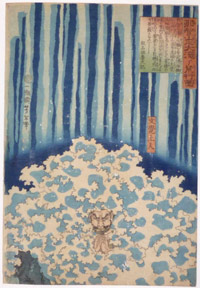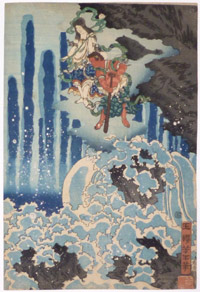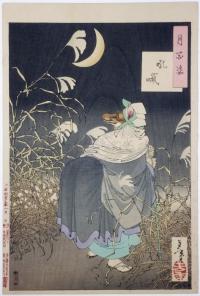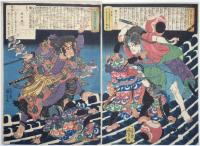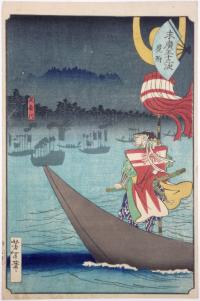Utagawa KUNIYOSHI (1798-1861)
Click here to view image full size.
One of Kuniyoshi’s finest designs from Rokuyosei Kuniyoshi jiman, “Six Conditions of Nature.” This design: Sembu: Not a very lucky day. Shows Mongaku ( Endo Morito, c. 1120 – 1200 ) subjecting himself to three years penance as a Buddhist monk beneath the waterfall of Mount Nachi in Kii Province. Morito inflicted this punishment on himself because he had inadvertently cut off the head of Kesa Gozen, the wife of the palace guard Watanabe Wataru, with whom he was in love. This subject lends itself to some wonderful designs: See this website for a rare horizontal triptych by Yoshitoshi and a vertical triptych by Kuniyoshi, and there are many single sheets by various artists. Published by Uoya Eikichi, year of the monkey, 1860. Robinson S93.4 and illustrated in colour, pl. 29, Kuniyoshi: The Warrior-Prints, Phaidon, 1982. Rare.
Superb impression of the first edition with splashed gofun. Fine colour. Minimal trimming, otherwise fine condition. Signed Cho-o-ro Kuniyoshi ga.
Status: Sold
Utagawa KUNIYOSHI (1798-1861)
Click here to view image full size.
Tamatori-hime stealing the sacred jewel from the Dragon King’s Palace, Ryugu Tamatori-hime no zu. Published by Yamaguchiya Tobei, Ox 6, 1853. The ama is shown being pursued by the Dragon King and his various fishy retainers. This was a favourite subject of Kuniyoshi’s and he designed a number of triptychs and single sheets. A wonderful and rare design.
Fine impression and colour. Extensive splashed gofun. Trimmed round, otherwise very good condition. Signed Chooro Kuniyoshi ga and Ichiyusai Kuniyoshi ga.
Status: Sold
Utagawa KUNIYOSHI (1798-1861)
Click here to view image full size.
Saginoike Heikuro from Honcho Suikoden goyu happyaku-nin no hitori, “Eight Hundred Heroes of our Country’s Suikoden, One by One.” Shows the brigand wrestling with a huge serpent at the Lake of Sayama ( or Hazama ) at Tondabayashi in the Province of Kawachi. Published by Ibaya Sensaburo, c 1845. Robinson S4b.4. Fine design.
Very good impression and colour. Full size. Slightly soiled bottom left, otherwise very good condition. Signed Ichiyusai Kuniyoshi ga.
Status: Sold
Utagawa KUNIYOSHI (1798-1861)
Click here to view image full size.
Tenjiku Tokubei ( 1619-1686 ) from an untitled series of warrior prints published by Kawaguchi Uhei, 1826-27. Tokubei was celebrated for his travels to India, Macao and Siam, and subsequently wrote about his exploits. He is usually represented surrounded by frogs and making magic with his fingers ( as here – Gama Yojutsu ) which enabled him to change into a frog. He is shown astride an enormous frog in a thunderstorm. Fine design.
Very good impression and colour. Slightly trimmed at bottom, otherwise very good condition. Signed Ichiyusai Kuniyoshi ga.
Status: Sold
Utagawa KUNIYOSHI (1798-1861)
Click here to view image full size.
Ogata Shuma Hiroyuki ( later Jiraiya ) from Honcho Suikoden goyu happyaku-nin no hitori, “Eight Hundred Heroes of our Country’s Suikoden, One by One.” Shows the brigand with a heavy o-zutsu, hand cannon, bearing down on an enormous snake which had been preying on his friends the toads. Published c 1830 by Kaga-ya Kichiyemon. Robinson S4.12. Fine design.
Very good impression and colour. Slightly trimmed right and bottom, otherwise very good condition. Signed Ichiyusai Kuniyoshi ga.
Status: Sold
Torii KIYOMASU (FL. c. 1696-1720)
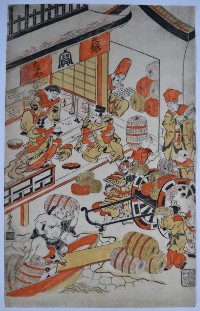
Click here to view image full size.
An overlarge oban, 19.5 x 12.25 in; 49.5 x 31 cms. Coloured by hand with tan and mustard yellow. Shows the emporium of Daikokuten, the God of wealth and one of the Seven Lucky Gods (Shichifukujin). He is shown at the top seated in front of a pair of scales. Seated before him, to the left, is Benzaiten, the Goddess of love and music. On the right is Ebisu, God of fishermen and good luck. Behind him is Fukurokuju, the God of happiness and wealth, using an abacus. On the far right is Jurojin, the God of longevity. Below him, next to the cart, is Bishamonten, the God of war and warriors. At the bottom, stepping from the boat, is Hotei, the God of happiness. All the Gods are helping, together with rats, to unload bales of rice. The earliest depictions of the Seven Gods are in the second half of the 17th century and are amalgams of Indian and Chinese lore. This early rendition still hasn’t the fully developed characteristics of the Gods – especially Hotei – which we see in the 19th century. Published by Komatsuya (who published c. 1707-1734) c. 1710-1715. Little is known of Kiyomasu’s early career. He may have been the brother of Kiyonobu. An important painter and print artist. Of the utmost rarity: probably the only impression extant.
Very good impression. Some expert edge restoration, otherwise very good colour and condition. Signed Torii shi with Kiyomasu seal.
Status: Sold
Utagawa KUNIYOSHI (1798-1861)
Click here to view image full size.
The ronin Yada Gorosaemon Suketake. A snow scene showing him facing an adversary with sword raised. From a fine set of twelve half length portraits of the forty-seven ronin: Seicho gishi shozo, “Portraits of Faithful Samurai of True Loyalty.” The depictions borrow strongly from western portraiture including imitation western script in the green border of the title cartouche. It is not necessary to repeat the story here as it is the best known Japanese tale. Published by Sumiyoshiya Masagoro, 12/1852.
Fine impression. Fine colour. Full size with extra paper left and top. Slight soil left margin, otherwise fine condition. Extensive splashed gofun to imitate snow. The printing on this set is exceptional with details such as the sword blades and title cartouches burnished. Signed Kuniyoshi ga.
Status: Sold
Utagawa KUNIYOSHI (1798-1861)
Click here to view image full size.
A Chinese brigand ( Shinwa-Yi ? ) hanging onto a rock in a fast-flowing river. Above and below him other submerged protagonists. From an early set: Tsuzoku sangokushi yeiyu no ichi-ni, “Popular Heroes of the History of the Three Kingdoms.” Published c. 1837 by Joshuya Kinzo. Extremely rare: Not known to Robinson ( S.10 ) who only lists 8 prints ( including a key-block proof ) from this set. Possibly unrecorded.
Very fine impression, colour and condition ( proof state ). Full size with extra paper all round. Signed Cho-o-ro Kuniyoshi ga.
Status: Sold
Kawanabe KYOSAI (1831-1889)
Click here to view image full size.
MAY in romaji from a set of the twelve months, Junikagetsu no uchi, although this is the only known design for the set. One of Kyosai’s best designs. Shows Shoki, the “Demon Queller” riding a tiger and brandishing his two-edged sword at a group of terrified oni. Shoki ( Chinese: Chung K’wei ) was lauded for having relieved the Emperor Ming Hwang of the fever demon during his sleep. A favourite subject for Japanese artists, although mostly ignored by the Chinese. Published by Fukuda Kumajiro, 1887. Paintings of Shoki were hung on Boy’s Day ( 5th day of the 5th month ). Hence Kyosai choosing this subject for May.
Fine impression and colour. Very slight edge foxing, otherwise fine condition. This design is notorious for often being heavily trimmed and consequently for the three sheets not aligning properly. This example completely untrimmed with extra paper all round. Rare. Signed Kyosai ga.
Status: Sold
Taiso YOSHITOSHI (1839-1892)
Click here to view image full size.
Soga no Goro galloping at high speed, whipping the steed with a bamboo branch. He races to the aid of his brother in Oiso. This famous story tells how the brothers avenged the death of their father Sukeyasu by Suketsune who was under the protection of the shogun Yoritomo. The Soga brothers kill Suketsune but Juro is killed in the ensuing fight and Goro is subsequently beheaded. Published 1885 by Fukuda Yasushi. One of the great Yoshitoshi designs and rare.
Fine impression and colour. In exceptional condition. A design invariably trimmed whilst this impression has all margins intact. Signed Oju Yoshitoshi hitsu.
Status: Sold
Utagawa KUNIYOSHI (1797-1861)
Click here to view image full size.
The ronin Nakamura Kansuke Masatatsu dodging a brazier of hot ash. The best design from a fine set of twelve half length portraits of the forty-seven ronin: Seicho gishi shozo, “Portraits of Faithful Samurai of True Loyalty.” The depictions borrow strongly from western portraiture including imitation western script in the green border of the title cartouche. It is not necessary to repeat the story here as it is the best known Japanese tale. Published by Sumiyoshiya Masagoro, 12/1852.
Fine impression, colour and condition. Full size and the falling ash from the brazier represented by sprayed gofun ( slight loss ). The printing on this set is exceptional with details such as the sword blades and title cartouches burnished. Signed Kuniyoshi ga.
Status: Sold
Tsukioka YOSHITOSHI (1839-1892)
Click here to view image full size.
The ghost of Genta Yoshihira, having been executed by Taira no Kiyomori, springs into the air causing a thunderstorm and exacting revenge. The best design from Shingata sanjurokkaisen, “New Forms of Thirty-six Ghosts.” Published 1889 by Sasaki.
Very fine impression, colour and condition. The first edition. Signed Yoshitoshi.
Status: Sold
Utagawa KUNIYOSHI (1797-1861)
Click here to view image full size.
A triptych showing Koman, the widowed daughter of a Lake Biwa farmer, swimming with the white banner of the Genji in her teeth towards the Taira barge of Munemori. On being picked up and finding where she was she jumped overboard but not before Sanemori cut her arm off with the banner wrapped round it. For the full story see Pointers And Clues To The Subjects Of Chinese And Japanese Art, Sampson Low Marstone & Co. Ltd., Will Edmunds, 1934, p. 451. Published By Iseya Ichibei, 1846.
Very fine impression, colour and condition. Full size. Signed Ichiyusai Kuniyoshi ga.
Status: Sold
Utagawa KUNIYOSHI (1797-1861)
Click here to view image full size.
A triptych showing Raiko attacking the Shuten-doji. A well know myth covered by numerous artists of all periods. Shuten-doji, “Great Drunken Boy” had great strength and atrocious habits, plundering the countryside around his stronghold on Oyeyama, “Devil’s Mountain.” The Emperor Murakami, losing patience, ordered Raiko to put an end to his exploits with the aid of a magic cap and poisoned sake. Raiko and his main retainers: Sakata no Kintoki, Usui no Sadamitsu, Watanabe no Tsuna, and Urabe no Suyetake stupefied the enormous hulk that was Shuten-doji and decapitated him. Depictions of this scene usually show the head flying through the air and it often has a more gruesome appearance with fangs and horns. Raiko returned in triumph with the head to Kyoto. One of Kuniyoshi’s best designs. Published c 1851-2 by Amatsu. Robinson T261. Rare.
Fine impression and colour. Some oxidation as usual. Slight trimmimg, otherwise very good condition. Signed Ichiyusai Kuniyoshi ga.
Status: Sold
Tsukioka YOSHITOSHI (1839-1892)
Click here to view image full size.
Saito Oniwakamaru, “Young Devil Child” ( Benkei ) fighting the giant carp in the waterfall of Bishamon ga taki. The best design from a fine set: Ikkai zuihitsu, “Essays by Yoshitoshi.” A set of 13 prints published by Masadaya in 1872. There are numerous variations in seals in this fine set but, as yet, no research has been done into their significance. However, this appears to be the first edition. There are versions with publisher’s seals right margin in red and in black and missing altogether. The earliest impressions, as here, have no gradation below the top two currents. Also, the slightly later editions use stronger aniline colours. One of Yoshitoshi’s great designs.
Fine impression with strong woodgrain. Fine colour. Retains original album backing. Slight trimming top margin. Signed Ikkaisai Yoshitoshi hitsu.
Status: Sold
Tsukioka YOSHITOSHI (1839-1892)
Click here to view image full size.
A vertical diptych of Kato Kiyomasa ( 1562-1611 ). A famous general best known for his participation in the invasion of Korea. Shows him seated before his personal banner inscribed Nan myo no rengekyo, “Hail Lotus Sutra.” On his breast is his mon, a large ring. Published by Maruya Jimpachi, 1867. Rare.
Fine impression and colour. Slight offsetting of blue on banner, otherwise extremely good condition. Full size so that the two sheets fit perfectly. Signed Oju kaisai Yoshitoshi.
Status: Sold
Tsukioka YOSHITOSHI (1839-1892)
Click here to view image full size.
Shows a scene during the siege of Nagashino Castle by Takeda Katsuyori. Torii Suneemon Katsutaka was sent to get help and managed to evade the guards. He insists on returning to his comrades but meanwhile Takeda had fastened bells to the cables on the castle’s exit which gave the alarm and frightens a flock of herons. Katsutaka was captured and died a samurai’s death shouting hold fast to his comrades. Takeda’s troops were subsequently massacred. Published by Kinseido, 1862. From a series Bidan musha hakkei, “Eight Views from Fine Tales of Warriors.”
Fine impression and colour. The rain burnished and the birds’ plumage gauffraged. Slight edge restoration, otherwise very good condition. Signed Tsukioka Yoshitoshi hitsu.
Status: Sold
Utagawa KUNIYOSHI (1797-1861)
Click here to view image full size.
The ronin Mase Magokuro Masatoki swimming to the surface surrounded by two rays and an octopus. His sword is loosely strapped around his waist. From a set Seichu gishin meimei kagami, “Mirror of the True Loyalty of the faithful Retainers, Individually.” Published by Iseya Isaburo, 1857. Robinson S90.41. A fine design.
Fine impression and colour. Extensive sprayed gofun ( oxidised ). Light discolouration top right, but otherwise good condition. Signed Ichiyusai Kuniyoshi ga.
Status: Sold
Tsukioka YOSHITOSHI (1839-1892)
Click here to view image full size.
Roba kiwan o mochisaru zu from Shinkei sanjurokkaisen, “New Forms of Thirty-six Ghosts.” The best design from the set published by Sasaki Toyokichi, 1889. This famous story recounts how Watanabe no Tsuna cuts off the arm of the demon Ibaraki at the Rashomon Gate, Kyoto in 976. He secretes the arm away in a box. Subsequently he is visited by his wet-nurse ( or aunt – depending on which version you read ) who convinces him to show it to her. Instantly she snatches the arm and flies off revealing herself to be Ibaraki in disguise. The story became the famous no play Ibaraki. Ex John Stevenson collection.
Fine impression and colour. The first edition. Slight edge crease on left border, otherwise very good condition. Signed Yoshitoshi.
Status: Sold
Tsukioka YOSHITOSHI (1839-1892)
Click here to view image full size.
The best design from the set Tsuki hyakushi, the “Hundred Phases of the Moon”. The set published between 1885 and 1892 ( this being 1886 ) by Akiyama Buemon. Benkei against a full moon. In 1185 Yoshitsune attacked by his half-brother Minamoto no Yoritomo, was forced to flee to northern Japan by ship. Sailing along the Inland Sea off the coast of Harima Province not far from Kyoto, the ship was struck by a storm in Daimotsu Bay caused by the vengeful ghosts of the Taira warriors Yoshitsune and his men had slain. Benkei pacified the spirits in the prow of the boat.
Fine impression, colour and condition. An impression that has not been in an album: Full margins with very extensive mica. Signed Yoshitoshi.
Status: Sold
Ichiyusai KUNIYOSHI (1797-1861)
Click here to view image full size.
The apparition of the Sea Monk, Umibozu, looming above the sailor Kawanaya Tokuzo. The best design from Tokaido gojusan tsui, Station 41, Kuwana. The legend has it that Tokuzo, against the advice of his peers, went to sea on the last day of the year. He subsequently experienced huge seas and the monster who demanded to know what was the most horrible thing he knew. He replied that his profession was the most horrid. Satisfied, the creature descended into the Stygian gloom and the storm abated. Published by Kojima-ya Jubei, c. 1845. Illustrated in Robinson, Kuniyoshi, HMSO, 1961, no. 49.
Fine, early impression with the light blue on the sea. Fine colour. Expert remargin at bottom but retaining black border. Signed Ichiyusai Kuniyoshi ga.
Status: Sold
Ichiyusai KUNIYOSHI (1797-1861)
Click here to view image full size.
Musashi-bo Benkei overcome by Onzoshi Ushiwaka Maru on Gojo Bridge under a full moon. Benkei was enormously tall and strong and had defeated many challengers on the bridge in Kyoto. However, he met his denouement in Yoshitsune who, although much smaller, was a fencing master. He is shown holding Benkei down with his geta, sword and large stave. From a rare set published by Tsuta-ya Kichizo, c. 1843. Robinson S1f 3.
Very good impression and colour. Slight trimming all round, otherwise very good condition. Signed Ichiyusai Kuniyoshi ga.
Status: Sold
Ichiyusai KUNIYOSHI (1797-1861)
Click here to view image full size.
A triptych showing the Soga Brothers’ last stand in the rain on Suso Moor under Mount Fuji. Fuji no Suso-no Soga kyodai hommo wo togeru zue. Published by Yamaguchi-ya Tobei, c. 1845. A subject covered by many artists. Illustrated in Robinson, Kuniyoshi, HMSO, 1961, no. 44.
Very good impression and colour. Slightly trimmed at bottom, otherwise very good condition. Signed Ichiyusai Kuniyoshi ga.
Status: Sold
Tsukioka YOSHITOSHI (1839-1892)
Click here to view image full size.
The old hag of the Lonely House. A gruesome subject: The evil witch is intent on cutting open the pregnant woman’s belly to get at the unborn child whose blood she needs for a magic potion. From Ikkai zuihitsu, “Essays by Yoshitoshi.” A set of 13 prints published by Masadaya in 1872. There are numerous variations in seals in this fine set but, as yet, no research has been done into their significance.
Very fine impression and colour. Trimmed close on the left but retaining black border. Retains original album backing. Signed Ikkaisai Yoshitoshi hitsu.
Status: Sold
Tsukioka YOSHITOSHI (1839-1892)
Click here to view image full size.
Yamauba and Kaidomaru from Ikkai zuihitsu, “Essays by Yoshitoshi.” A set of 13 prints published by Masadaya in 1872 ( this design being 1873 ). Shows the mother and son ( also known as Kintaro ). He of the enormous strength is often shown acting as umpire at a wrestling match between a hare and a monkey. The Madonna-like figure here is one of the few Yoshitoshi designs to borrow heavily from western art. There are numerous variations in seals in this fine set but, as yet, no research has been done into their significance.
Very fine impression and colour. There is an alternate version of this print with Kintaro printed in a light brown. Trimmed close on the left but retaining black border. Retains original album backing. Signed Ikkaisai Yoshitoshi hitsu.
Status: Sold
Tsukioka YOSHITOSHI (1839-1892)
Click here to view image full size.
The monkey of phenomenal powers Sun Wukong battles Kinkaku Daio on a sea cliff. From a fine, rare and early set of at least 21 designs: Tsuzoku saiyuki, “Journey to the West” published by Fukuta between 10/1864 and 8/1865, this being 12/1864. The story covers the journey of Son Goku ( Chin. Sun Wukong ) a.k.a. The Monkey King to India, accompanying Xuanzang, to retrieve the Buddhist sutras. Sun Wukong, born from a stone, had supernatural powers; possessed enormous strength; could transform himself into other people and objects, and cover large distances in a single flip. The story covers 100 chapters and there are a multitude of characters and events. A fine design.
Fine impression. Minimal soil and fading. Signed Ikkaisai Yoshitoshi hitsu.
Status: Sold
Tsukioka YOSHITOSHI (1839-1892)
Click here to view image full size.
The monkey of phenomenal powers Sun Wukong battles a warrior ( Rakijo ? ) on a precipitous cliff over a choppy sea. From a fine, rare and early set of at least 21 designs: Tsuzoku saiyuki, “Journey to the West” published by Fukuta between 10/1864 and 8/1865, this being 12/1864. The story covers the journey of Son Goku ( Chin. Sun Wukong ) a.k.a. The Monkey King to India, accompanying Xuanzang, to retrieve the Buddhist sutras. Sun Wukong, born from a stone, had supernatural powers; possessed enormous strength; could transform himself into other people and objects, and cover large distances in a single flip. The story covers 100 chapters and there are a multitude of characters and events. A fine design.
Fine impression. Minimal soil and fading. Signed Ikkaisai Yoshitoshi hitsu.
Status: Sold
Tsukioka YOSHITOSHI (1839-1892)
Click here to view image full size.
The monkey of phenomenal powers Sun Wukong battles Kofuo, the wind demon who had captured Genjosanzo. From a fine, rare and early set of at least 21 designs: Tsuzoku saiyuki, “Journey to the West” published by Fukuta between 10/1864 and 8/1865, this being 12/1864. The story covers the journey of Son Goku ( Chin. Sun Wukong ) a.k.a. The Monkey King to India, accompanying Xuanzang, to retrieve the Buddhist sutras. Sun Wukong, born from a stone, had supernatural powers; possessed enormous strength; could transform himself into other people and objects, and cover large distances in a single flip. The story covers 100 chapters and there are a multitude of characters and events. A fine design.
Fine impression. Minimal soil and fading. Signed Ikkaisai Yoshitoshi hitsu.
Status: Sold
Tsukioka YOSHITOSHI (1839-1892)
Click here to view image full size.
The monkey of phenomenal powers Sun Wukong battles an enormous polka dot shishi lion. Shidado no roma. From a fine, rare and early set of at least 21 designs: Tsuzoku saiyuki, “Journey to the West” published by Fukuta between 10/1864 and 8/1865, this being 12/1864. The story covers the journey of Son Goku ( Chin. Sun Wukong ) a.k.a. The Monkey King to India, accompanying Xuanzang, to retrieve the Buddhist sutras. Sun Wukong, born from a stone, had supernatural powers; possessed enormous strength; could transform himself into other people and objects, and cover large distances in a single flip. The story covers 100 chapters and there are a multitude of characters and events. A fine design.
Fine impression. Minimal soil and fading. Signed Ikkaisai Yoshitoshi hitsu.
Status: Sold
Kobayashi KIYOCHIKA (1847-1915)
Click here to view image full size.
Shows ordinary seaman Nishikawa Hatsutaro of the corvette Katsuragi which saw action during the Sino-Japanese war ( 1/7/1894-17/4/1895 ). He appears to be saving something by covering it with his body. From a set Rikukaigunjin komei kagami, “Mirror of Army and Navy Heroes.” Published by Inoue Kichijiro, 2/1895. For whatever reason, a rare set. Fine design.
Fine impression and colour. Signs of mounting au verso, otherwise fine condition. Signed Kiyochika.
Status: Sold
Kobayashi KIYOCHIKA (1847-1915)
Click here to view image full size.
Shows Lieutenant Colonel Tomioka Sanzo charging on horseback. He was the commander of the 22nd infantry regiment during the Sino-Japanese war ( 1/7/1894-17/4/1895 ). From a set Rikukaigunjin komei kagami, “Mirror of Army and Navy Heroes.” Published by Inoue Kichijiro, 2/1895. For whatever reason, a rare set. Fine design.
Fine impression and colour. Signs of mounting au verso, otherwise fine condition. Signed Kiyochika.
Status: Sold
Kobayashi KIYOCHIKA (1847-1915)
Click here to view image full size.
Shows the army engineer Onoguchi Tokuji who destroyed the castle gate at Jinzhoucheng during the Sino-Japanese war ( 1/7/1894-17/4/1895 ). From a set Rikukaigunjin komei kagami, “Mirror of Army and Navy Heroes.” Published by Inoue Kichijiro, 2/1895. For whatever reason, a rare set. Fine design.
Fine impression and colour. Signs of mounting au verso, otherwise fine condition. Signed Kiyochika.
Status: Sold
Ichiyusai KUNIYOSHI (1797-1861)
Click here to view image full size.
The best design from Genji kumo ukiyoe awase, “Ukiyoe Comparisons of the Cloudy Chapters of Genji.” A set comparing famous warriors to the Chapters of the Genji Monogotari ( Tale of Genji ) written by Lady Murasaki Shikibu ( c 973 – 1025 ). This design is for Chapter 22, Tamakatzura. Shows the pearl diver, Tamatori-hime, who has reclaimed the precious pearl stolen by the Dragon King. She is pursued by a host of his aquatic retainers including a giant octopus before finally returning the jewel to her husband Fujiwara no Kamatari, albeit buried in her chest for safety and causing her death. A popular subject with Kuniyoshi who designed a number of other oban prints and triptychs on the subject. The Dragon King’s palace can be seen beneath the waves in the background. Published by Iseya Ichibei, 1843-5.
Very good impression, colour and condition. Each sheet lightly attached. Signed Ichiyusai Kuniyoshi ga.
Status: Sold
Ichiyusai KUNIYOSHI (1797-1861)
Click here to view image full size.
A vision of hell. In the centre sits Enma, King of Hell, dressed as a Chinese official flanked by minions. He sits in judgement deciding whether a deceased person had been good or bad. Those found wanting are subjected to horrendous tortures, miscreants being boiled, crushed, burnt or having their tongues pulled out. Mothers in Japan were known to threaten naughty children with a visit from Enma. Kuniyoshi is known to have owned a “hell” garment which he had painted and is often pictured wearing it. Published by Tsutaya Kichizo c. mid 1830’s. Rare. Another example illustrated in the new Nikkei/Mori Arts Center Kuniyoshi catalogue, no 111.
Very good impression, colour and condition. Each sheet lightly attached. Signed Ichiyusai Kuniyoshi ga.
Status: Sold
Tsukioka YOSHITOSHI (1839-1892)
Click here to view image full size.
A rare triptych Toyotomi shoshinroku, “A Record of the Advancement of Toyotomi Hideyoshi.” Shows the young Hideyoshi ( 1537 – 1598 ) demanding an apology from Hachisuka Koroku on Yahagi Bridge. Published c. 1869 by Yorozumago.
Fine impression and colour. Gauffrage and extensive burnishing. The paulownia border intact which is often trimmed. Signed Ikkaisai Yoshitoshi hitsu.
Status: Sold
Tsukioka YOSHITOSHI (1839-1892)
Click here to view image full size.
Arguably Yoshitoshi’s masterpiece in the triptych format. Shows Mongaku ( Endo Morito, c.1120-1200 ) subjecting himself to three years penance as a Buddhist monk beneath the waterfall of Mount Nachi in Kii Province. Morito inflicted this punishment on himself because he had inadvertently cut off the head of Kesa Gozen, the wife of the palace guard Watanabe Wataru, with whom he was in love. Published 1859 ( centre sheet ) and 1860 ( outside panels ) by Kadokin. Extremely rare: Another impression in the Baur collection, Geneve, Switzerland.
Fine impression, very good colour. Minor marks and small expertly restored wormage. Slight trimming. Extensive splashed gofun. Signed Ikkaisai Yoshitoshi hitsu.
Status: Sold
Tsukioka YOSHITOSHI (1839-1892)
Click here to view image full size.
A fox priest from Tsuki hyakushi, “One Hundred Phases of the Moon.” Based on the Kyogen farce Konkai, “A Fox’s Cry” which tells of a hunter who is lectured on trapping foxes by his uncle, a priest. On his way home his uncle turns into his true form, a fox, and is snared in a trap. Yoshitoshi’s design shows the uncle transmogrifying into a fox. The set published by Akiyama Buemon between 1885 – 92, this design issued 1/1886. One of the best designs from the set.
Very good impression and colour. Retains original light album backing. Signed Yoshitoshi
Status: Sold
Ichiyusai KUNIYOSHI (1797-1861)
Click here to view image full size.
Shows Inudzuka Shino Moritaka defending himself against Inukai Kempachi Nobumichi and his men on the Horyukaku roof. From a set of four diptychs ( often split ) published by Nishimuraya Yohachi, c 1835. Robinson S 5.6.
Very good impression. Fine colour and condition. Completely untrimmed. Signed Ichiyusai Kuniyoshi ga.
Status: Sold
Tsukioka YOSHITOSHI (1839-1892)
Click here to view image full size.
Mariko from the Fifty-Three Stations of the Tokaido Road. The set designed by several artists and various publishers to commemorate the journey of the Shogun from Edo to Kyoto in 2/1863. The best Yoshitoshi design from this set. Shows a battle fleet outside Mariko. Published by Yamaguchi 5/1865.
Very good impression and colour. Small fibre loss at extreme left edge. Very good condition. Signed Yoshitoshi fude.
Status: Sold
Ichiyusai KUNIYOSHI (1797-1861)
Click here to view image full size.
The pilot and nobleman Yoshibei leaps from his vessel to a rock in the Chopping Block Shoals and sacrifices himself to save his ship off the coast of Buzen Province. Meisho Kyushu yori joraku no toki. Published c 1850 by Santetsu. A wonderful and rare triptych which is seldom illustrated. Robinson T251.
Extremely fine impression. Fine colour and condition. Totally untrimmed. Colours do not quite match across the three sheets – a common fault on 19th century triptychs. Signed Ichiyusai Kuniyoshi ga.
Status: Sold
-warriors189_small.jpg)

